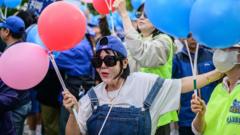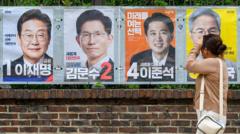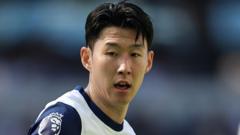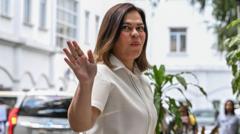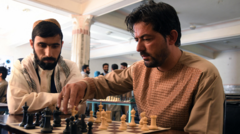Ahead of the June 3 presidential election, young women in South Korea feel sidelined as major candidates avoid addressing critical gender discrimination issues. Despite their significant role in past protests, candidates are refraining from highlighting feminist agendas to avoid alienating male voters.
South Korea's Upcoming Election: Women's Voices Drowned Out Amid Political Maneuvering

South Korea's Upcoming Election: Women's Voices Drowned Out Amid Political Maneuvering
As South Korea prepares for its presidential election, women express frustration over the lack of attention to gender issues by candidates.
In the lead-up to South Korea's presidential election on June 3, young women who historically have been at the forefront of political protests are increasingly feeling ignored by the candidates vying for office. These women were pivotal in the movement that led to the impeachment of former President Yoon Suk Yeol, who faced backlash for implementing martial law and for fostering an environment of gender discrimination.
Women often find themselves dismissed as politically apathetic, yet their activism during Yoon’s presidency showcased their desire for a safer and fairer society. As they prepare to cast their votes, many are anxious that their urgent concerns surrounding gender inequality, such as pay disparities, underrepresentation in leadership roles, and ongoing issues with online harassment, are being neglected once again.
The political landscape has become fraught with challenges. Young men, feeling economically insecure and fearing reverse discrimination, have been vocal about their frustrations. Their sentiments have made it politically risky for candidates to embrace feminist policies. Yoon's People Power Party successfully capitalized on these sentiments in the last election cycle, dismissing claims of systemic discrimination against women.
As the challenger, Lee Jae-myung of the Democratic Party, who lost the previous election to Yoon by a narrow margin, currently leads in the polls. However, he is navigating carefully around gender issues, recognizing the significant role young women played in Yoon's ousting but also wary of alienating male voters by appearing too progressive on gender matters.
With election day approaching, it remains to be seen if the voices of young women will finally be acknowledged or if the upcoming president will continue to ignore the pressing issues of gender discrimination that so deeply affect their lived experiences in South Korea. The hope for many is that a shift in leadership will usher in a new focus on equality and justice, but the current political climate suggests that women’s concerns might remain sidelined once again.
Women often find themselves dismissed as politically apathetic, yet their activism during Yoon’s presidency showcased their desire for a safer and fairer society. As they prepare to cast their votes, many are anxious that their urgent concerns surrounding gender inequality, such as pay disparities, underrepresentation in leadership roles, and ongoing issues with online harassment, are being neglected once again.
The political landscape has become fraught with challenges. Young men, feeling economically insecure and fearing reverse discrimination, have been vocal about their frustrations. Their sentiments have made it politically risky for candidates to embrace feminist policies. Yoon's People Power Party successfully capitalized on these sentiments in the last election cycle, dismissing claims of systemic discrimination against women.
As the challenger, Lee Jae-myung of the Democratic Party, who lost the previous election to Yoon by a narrow margin, currently leads in the polls. However, he is navigating carefully around gender issues, recognizing the significant role young women played in Yoon's ousting but also wary of alienating male voters by appearing too progressive on gender matters.
With election day approaching, it remains to be seen if the voices of young women will finally be acknowledged or if the upcoming president will continue to ignore the pressing issues of gender discrimination that so deeply affect their lived experiences in South Korea. The hope for many is that a shift in leadership will usher in a new focus on equality and justice, but the current political climate suggests that women’s concerns might remain sidelined once again.


